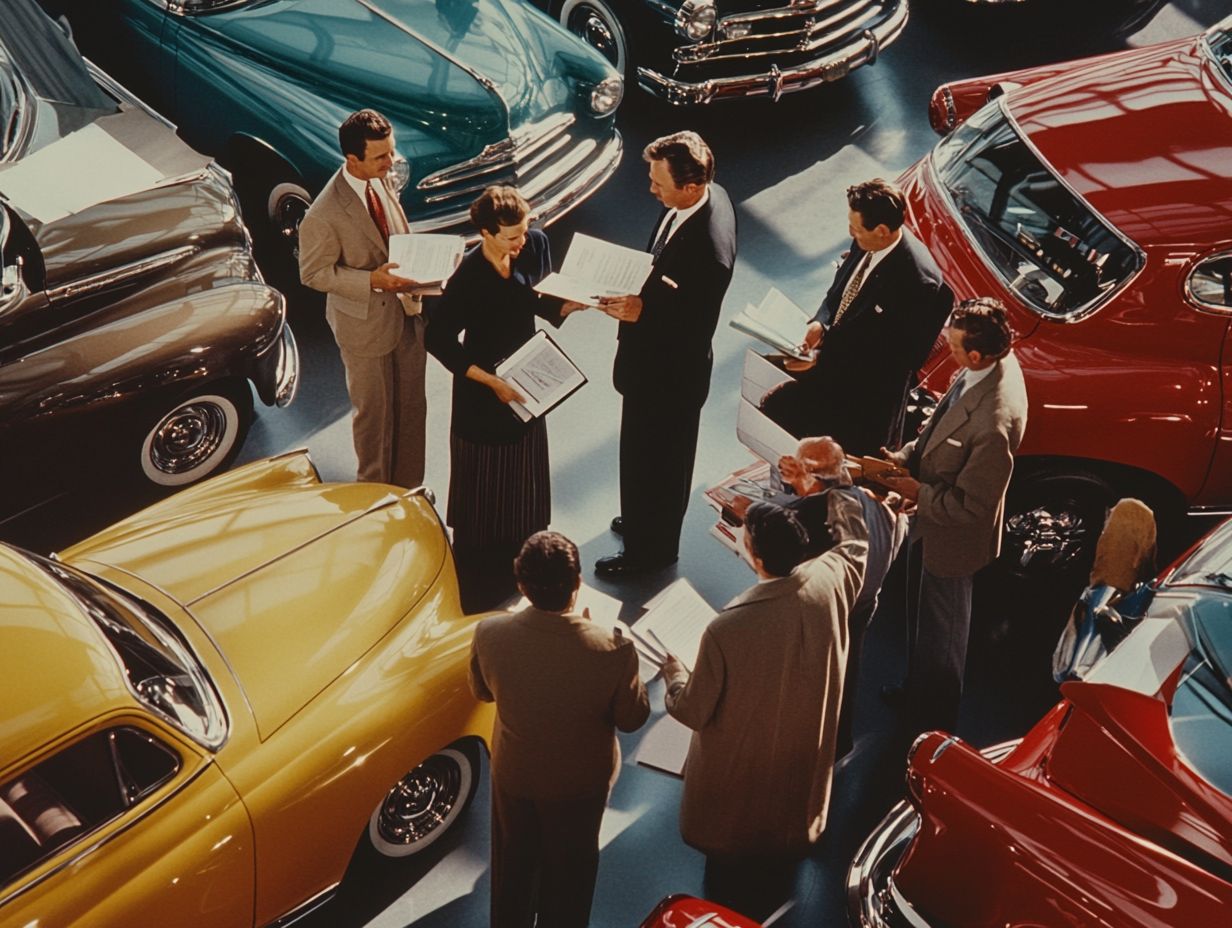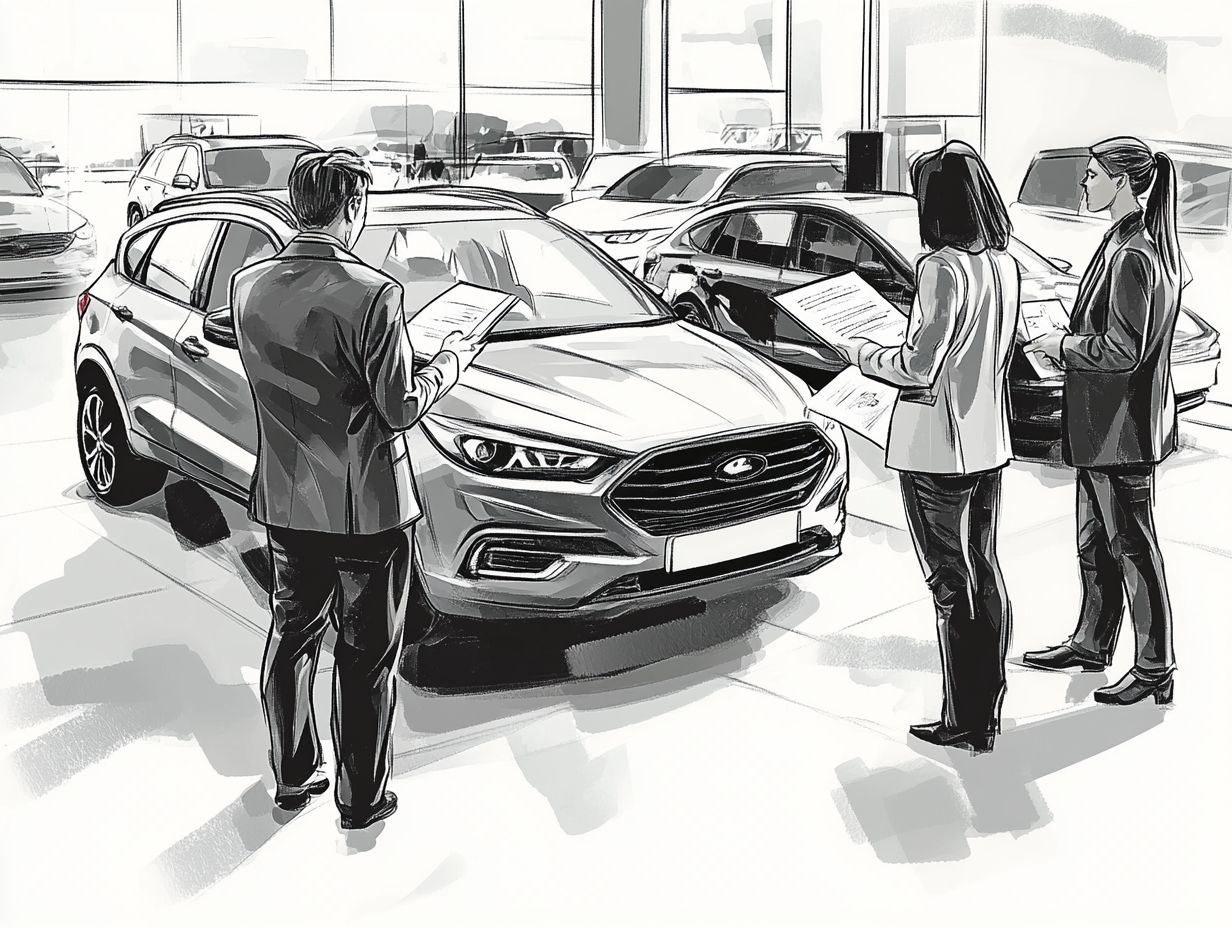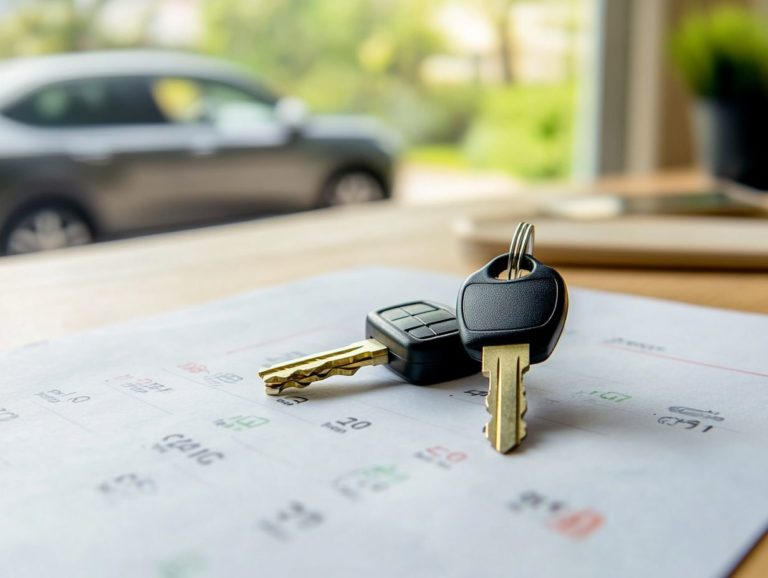5 Common Myths About New Car Buying
Buying a new car is a significant milestone, yet misconceptions can cloud your decision-making process.
You might believe that new is always better or think that negotiations are a must, but these myths can lead you astray.
This article explores five prevalent myths about purchasing a new car, revealing the truths behind each one. It also discusses the pros and cons of new versus used cars and offers valuable tips to help you make an informed choice.
Get ready to navigate the exciting world of new car buying with newfound clarity!
Contents
- Key Takeaways:
- 1. Buying a New Car Is Always Better Than Buying Used
- 2. Negotiating the Price is the Most Important Part of Buying a New Car
- 3. The Best Time to Buy a New Car is at the End of the Month
- 4. Buying a New Car Will Save You Money in the Long Run
- 5. The More Features and Add-Ons, the Better the Car
- Why Buy a New Car?
- Frequently Asked Questions
- 1. What are some of the most common myths about new car buying?
- 2. Is it true that buying a new car is always more expensive than buying a used one?
- 3. Are all new cars a waste of money?
- 4. Do all new cars depreciate in value quickly?
- 5. Are extended warranties necessary when buying a new car?
- 6. Can I only buy a new car from a dealership?
Key Takeaways:

- Buying a new car is not always better than buying used; consider your budget and needs before deciding.
- Negotiating the price is important, but don’t overlook other crucial factors like financing and warranty options.
- The best time to buy a new car isn’t always at the end of the month; research and compare prices throughout the year.
1. Buying a New Car Is Always Better Than Buying Used
Choosing a new car has distinct advantages over buying used. You gain peace of mind from its reliability, access to the latest technology, and comprehensive financing options. To make the most of this process, consider following these 5 steps to prepare for buying a new car. This enhances your car-buying experience and helps you avoid potential pitfalls like negative equity and high maintenance costs associated with used vehicles.
With a new car, you benefit from substantial warranty advantages that typically last three to five years, which can significantly reduce your repair costs. The chance for customization allows you to select features that perfectly match your lifestyle, whether that’s advanced safety systems or cutting-edge infotainment options.
Take Subaru, for example; their models often come with attractive financing rates, making them particularly appealing to first-time buyers.
As you start your purchasing journey, utilize online research tools to gain insights into the Manufacturer s Suggested Retail Price (MSRP) the recommended selling price. This information equips you to negotiate better deals and approach your purchase with confidence.
2. Negotiating the Price is the Most Important Part of Buying a New Car
Negotiating the price when buying a new car is essential, as it directly affects your vehicle’s overall affordability. This skill helps you secure a better deal at the dealership, whether you’re making a cash payment or leveraging your trade-in value and favorable financing rates.
Before visiting a dealership, thorough research can empower you. By understanding your desired vehicle’s market value and the dealership’s pricing strategies, you boost your confidence and gain valuable leverage during negotiations.
The quality of customer service is critical in this process. A respectful and attentive salesperson can make all the difference, facilitating a smoother transaction while fostering trust.
Emphasizing your trade-in value and exploring various financing options can help you negotiate a lower monthly payment or overall price. By being well-informed and assertive, you enhance your chances of achieving optimal terms in your car-buying journey.
3. The Best Time to Buy a New Car is at the End of the Month
Purchasing a new car at the end of the month offers a strategic advantage. Dealerships are often eager to meet sales targets, which can lead to better deals, enticing cash incentives, and competitive financing options that help close sales before the month ends.
This urgency creates an excellent environment for negotiations, making this a prime time for you to explore potential savings.
Don t miss out on amazing online deals act fast! Dealerships often promote special offers on their websites that aren’t widely advertised, giving savvy consumers like you a distinct edge.
Special ordering your vehicle can lead to even greater discounts, especially if you’re flexible with your preferences. By timing your purchase wisely and utilizing available resources, you can maximize your savings and drive away in a vehicle that represents exceptional value.
4. Buying a New Car Will Save You Money in the Long Run

Investing in a new car can be a smart financial move. New cars generally have lower maintenance costs and better fuel efficiency. You can also secure favorable financing options, ultimately saving money through reduced interest rates and providing a more reliable vehicle.
New cars typically come with comprehensive warranties that cover many repairs for several years. This spares you from unexpected expenses that often come with older, used vehicles.
Many dealerships offer promotions like zero-percent interest rates or cash-back deals. These can significantly lower your monthly payments.
Research shows that while a used car might seem cheaper at first, the long-term financial benefits and peace of mind that a new vehicle offers often outweigh those short-term savings.
5. The More Features and Add-Ons, the Better the Car
Purchasing a new car with enhanced features and add-ons can elevate your driving experience. You can take advantage of dealership incentives and rebates, making this investment even more appealing.
Modern cars come equipped with advanced safety features that keep you safe on the road, like adaptive cruise control and automated emergency braking.
The latest infotainment systems allow you and your passengers to integrate your devices for music, navigation, and communication. This not only enhances safety and convenience but also increases your satisfaction as a driver.
When selecting these options, consider financing strategies, as they will influence the affordability of your enhanced driving experience.
Why Buy a New Car?
Buying a new car has many benefits, including advanced safety features and improved financing options. You’ll have the peace of mind of knowing your vehicle is reliable and retains its value well.
A new car usually comes with comprehensive warranties, protecting you from unexpected repair costs and helping to minimize long-term maintenance expenses.
Newer models also offer better fuel efficiency, leading to more savings at the pump.
Enhanced safety features like adaptive cruise control significantly boost road safety, giving you more confidence while driving.
A positive experience at the dealership fosters trust and satisfaction, making your entire purchasing journey enjoyable.
What Are the Disadvantages of Buying a New Car?
While buying a new car can be enticing, it’s essential to consider the downsides. New vehicles typically experience higher depreciation rates compared to used ones, but knowing 5 tips for finding the best new car deals can help you make a more informed decision.
You may encounter complexities with MSRP pricing, searching for a more budget-friendly deal. New cars can lose as much as 20% of their value the moment they leave the lot, making the financial commitment heavier than opting for a pre-owned vehicle.
Financing rates can also be higher for new models, inflating your monthly payments and overall costs.
Used cars offer lower prices and stable depreciation, making them a more appealing option.
By choosing a pre-owned vehicle, you can manage your budget more effectively and potentially redirect savings toward maintenance or upgrades, enhancing your ownership experience.
What Are the Most Important Factors to Consider When Buying a New Car?

When you’re on the hunt for a new car, several key factors deserve your attention to ensure a purchase experience that leaves you satisfied, including 5 ways to save money on your new car purchase.
You ll want to understand your financing options, evaluate the trade-in value of your current vehicle, and assess how monthly payments align with interest rates and your overall budget.
Consider the type of vehicle that best suits your lifestyle and personal preferences. Whether you need a compact sedan for navigating city streets or a spacious SUV for family adventures, this choice can significantly impact your driving experience.
Don t underestimate the importance of the dealership s reputation. A trusted dealer provides peace of mind with quality products and offers exceptional customer service to guide you through the intricate purchasing process.
Don t miss the chance to compare multiple offers from banks and credit unions. Understanding the terms can profoundly affect your final pricing.
Remember, making a well-informed decision leads to a smoother and more enjoyable car-buying experience.
What Are the Most Common Mistakes People Make When Buying a New Car?
Many car buyers often fall into familiar traps during the purchasing process. They might skip vital research on vehicle values, overlook various financing options, and miss important details at the dealership that can shape their overall experience. To avoid these pitfalls, first-time buyers should consider 5 tips for first-time new car buyers.
Without proper research, you might underestimate a car’s true worth, leading to overpaying and making regrettable financial decisions. Utilize online resources that offer market valuations and comparative analyses to guide your choices.
Many potential owners also miss the chance to explore multiple financing options. This can result in less favorable loan terms that significantly inflate monthly payments.
To steer clear of these pitfalls, thorough preparation and a solid understanding of financing alternatives are crucial. This approach helps you save money and make informed decisions that align with your long-term financial goals.
What Are the Benefits of Buying a Used Car Instead?
Buying a used car offers numerous advantages, including significantly lower purchase prices, reduced depreciation rates, and the chance to snag a vehicle with premium features at a fraction of the cost of a new model.
Financing a pre-owned vehicle often leads to lower monthly payments. This can alleviate some pressure on your budget. Unlike new cars that lose value quickly, used models tend to retain more of their worth over time, enhancing their trade-in potential.
For many, the blend of affordable financing rates and the financial flexibility provided by lower insurance premiums makes a used car a highly appealing choice.
These factors enable you to maximize your investment, setting the stage for a more financially sound decision in the long run.
How Can One Ensure They Are Getting a Good Deal on a New Car?
To secure a great deal on a new car, it’s vital for you to do thorough research on vehicle values and take advantage of online deals. Hone your negotiation skills, and comparing financing options will help you find competitive rates that align with your budget.
Begin by tapping into reputable online resources like Kelley Blue Book or Edmunds to obtain an accurate appraisal of the vehicle you’re eyeing. Compare similar models and their features to strengthen your position.
With this information in hand, craft effective negotiation strategies. Approach the dealer armed with your research and be ready to counter their initial offers. Familiarizing yourself with various financing options such as loans from banks or dealership financing gives you a distinct edge during negotiations.
Knowing your credit score helps you make informed financing decisions, ensuring you avoid overpaying for your loan.
Frequently Asked Questions

1. What are some of the most common myths about new car buying?
Many believe buying a new car is always more expensive than buying a used one. However, with the right approach, you can navigate the process smoothly. Consider following these 5 tips for a stress-free new car purchase to make informed decisions and avoid common pitfalls.
2. Is it true that buying a new car is always more expensive than buying a used one?
No, this is not always the case. While new cars may have a higher upfront cost, they often come with manufacturer warranties and lower maintenance costs. These factors can make them a more cost-effective choice in the long run.
3. Are all new cars a waste of money?
No way! New cars are packed with the latest technology and safety features. They can save you money on fuel and repairs in the long run.
4. Do all new cars depreciate in value quickly?
Not necessarily. While all cars depreciate over time, new cars can hold their value better due to their lower mileage and updated features. It’s important to research the specific make and model to see how it retains value over time.
5. Are extended warranties necessary when buying a new car?
It depends on the individual and the specific car. If you want peace of mind when driving your new car, consider whether an extended warranty a plan that covers repairs after the manufacturer s warranty ends is right for you.
6. Can I only buy a new car from a dealership?
No, you can also buy a new car from a private seller. However, buying from a dealership often comes with added benefits, such as warranties, financing options, and the ability to test drive the car before purchasing.






